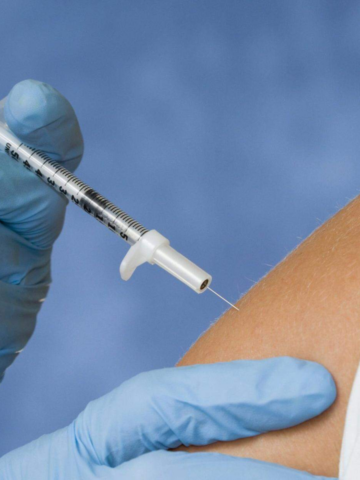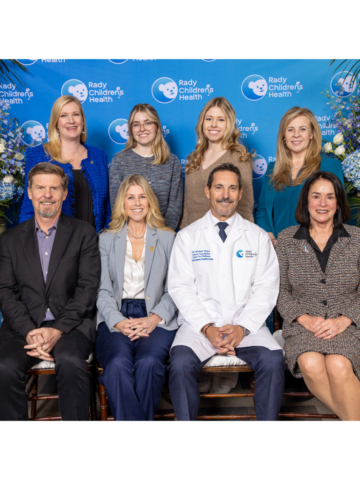Morgan is a 21-year-old CHOC volunteer who is headed into her junior year at Stanford University. A human biology major, Morgan aspires to one day be a physician at CHOC.
Why?
“CHOC is where I got a second chance,” she says.
As a child, Morgan was in and out of the hospital. At age 12, Morgan experienced her first lengthy hospitalization at CHOC after being admitted for five weeks with severely low blood pressure and heart rate. At that time, Morgan remembers the feeling of hopelessness she felt.
“I had kind of given up on myself and my health. I felt I would never have an opportunity to follow my dreams or have any sense of normalcy in childhood,” says Morgan.
With the care of CHOC experts, Morgan was diagnosed with complex diagnoses including postural orthostatic tachycardia syndrome – otherwise known as POTS – and mast cell activation syndrome (MCAS).
It was during her time at CHOC that her sense of childhood came back. She felt cared for by everyone she interacted with, and she felt the urgency and support from CHOC physicians to help her get answers after years of unsettled symptoms.
“Nobody’s giving up on anyone, even if you have a complex medical case, CHOC physicians are really in it to help heal,” Morgan says.

Morgan later transitioned to an outpatient facility as she gradually got better and continued her healthcare journey with numerous outpatient care visits – which took her away from school for much of her sixth-grade year.
After learning to manage her diagnoses with lifestyle changes and medications, Morgan felt a sense of relief until about four years later when she suffered a concussion. Then a sophomore in high school, Morgan’s symptoms got significantly worse and she began experiencing new symptoms.
Until about age 19, Morgan continued her care at CHOC, where she had a dedicated multidisciplinary team that, through their hard work, helped Morgan be able to excel and do things that she dreamed of doing for many years – which now includes volunteering at CHOC.
Today, Morgan dedicates her time while on break from school to volunteering at CHOC’s Cherese Mari Laulhere Child Life Department. In just a short five months, she has volunteered over 150 hours and has been assigned as a lead, a role that trains new CHOC volunteers. Having the opportunity to bring a sense of childhood to patients at CHOC is what drives Morgan.
Morgan shares that cleaning the toys in the playroom is one of her favorite parts of being a CHOC volunteer. Being able to meet children, learn their interests and bring them a tray of toys to help carry them joy throughout their stay is great.
“There’s that wonderful feeling when I come in at the beginning of my shift and I start cleaning toys and I recognize the toys that I gave to kids,” Morgan says. “Knowing that I’m cleaning toys for a child who was able to build happy memories at CHOC and recover enough to leave the hospital is always the most meaningful part.”

This is not Morgan’s first summer at CHOC.
Last summer, she participated in CHOC’s Medical Intelligence and Innovation Institute (Mi4) Summer Internship Program. After applying for three years in a row, Morgan was accepted and enjoyed what she described as an incredible experience. For three days a week, she shadowed physicians from different specialties including the emergency medicine department, palliative care, respiratory care, orthopedic surgery, inpatient and outpatient endocrinology, inpatient and outpatient neurology, the neonatal intensive care unit (NICU), pediatric intensive care unit (PICU) and the cardiovascular intensive care unit (CVICU).
As a part of her internship, she attended lectures to learn about the latest advancements in healthcare. The combination of shadowing and lectures allowed Morgan and her cohort to create an abstract for a novel product, device or program that could help address a specific area of healthcare to improve patient care.
For Morgan – as a former patient who recalls having a difficult time sleeping during her hospital stays – her abstract was an idea for a device that could help patients’ sleep patterns while they’re hospitalized.
“I came up with this idea to use patient vitals and preexisting attachments on a patient such as their respiratory rate, oxygen levels and heart rate monitor to see not only when a patient was asleep, but also to learn what stage of sleep they are in – making it so that there would be a gradual wake up system,” Morgan says. “The algorithm would learn over time the most efficient and least invasive way to wake up the patient whenever a person was entering the room.”
The opportunity to be a Mi4 intern has increased Morgan’s awareness of medical innovation, and she continues to think about innovative ways to help patients, especially at CHOC as she volunteers.
Even with her junior year of college quickly approaching, Morgan is already looking forward to winter and her next summer break – when she’ll come back and volunteer at CHOC.




